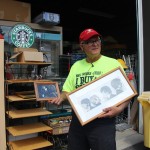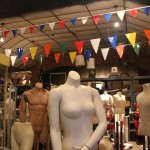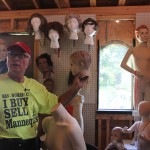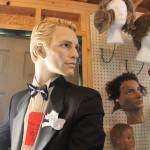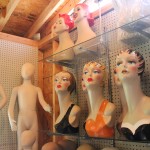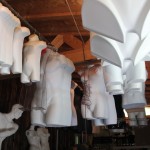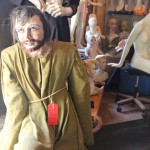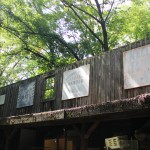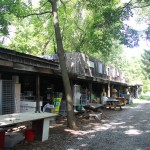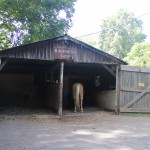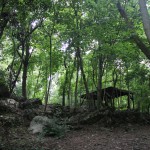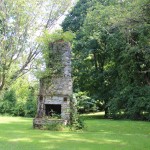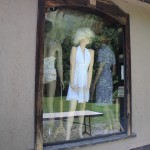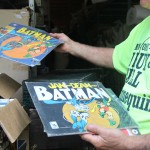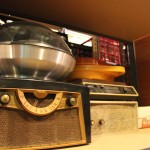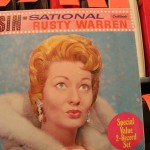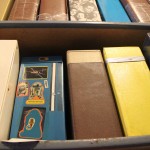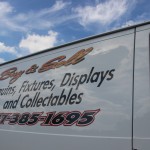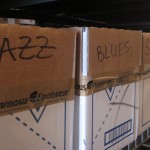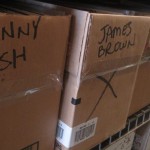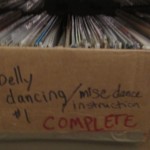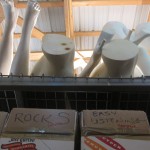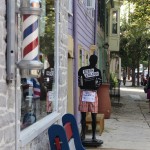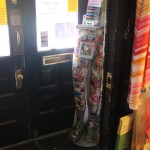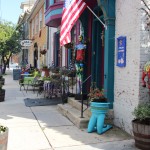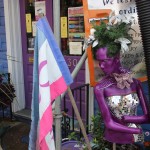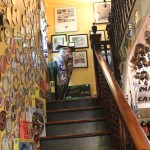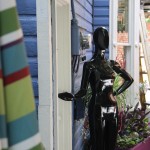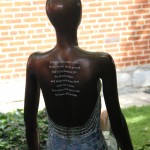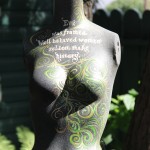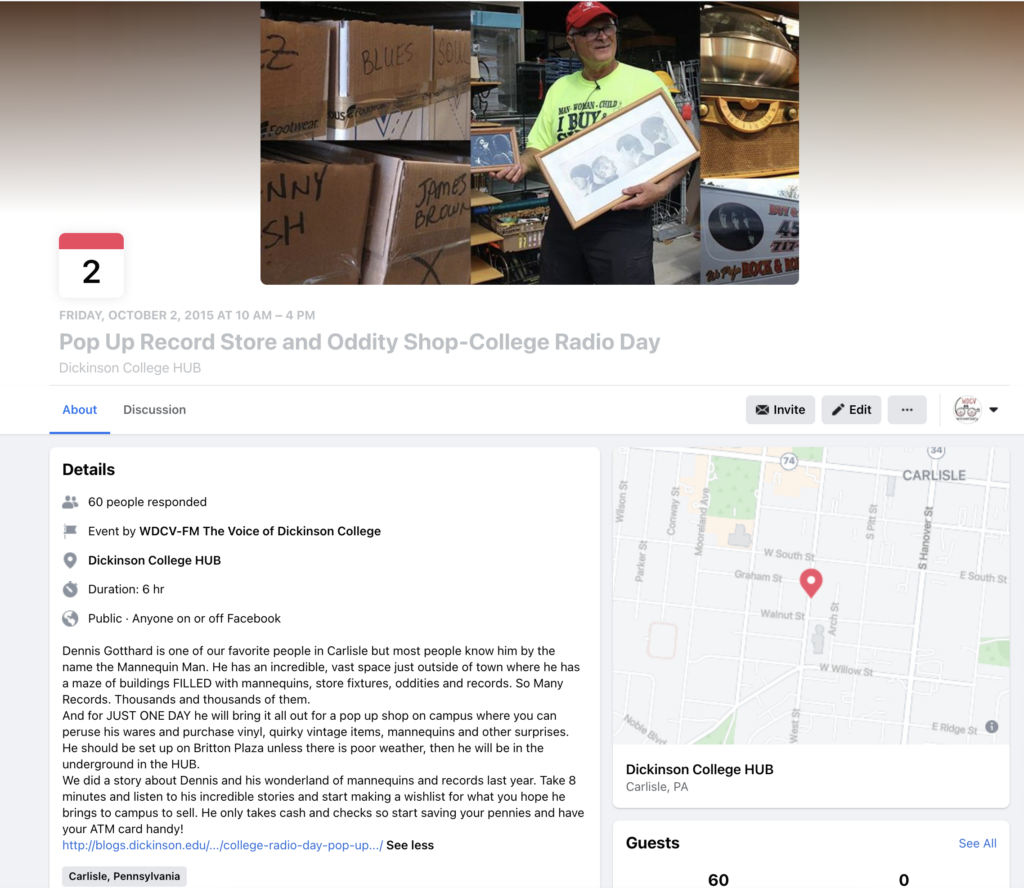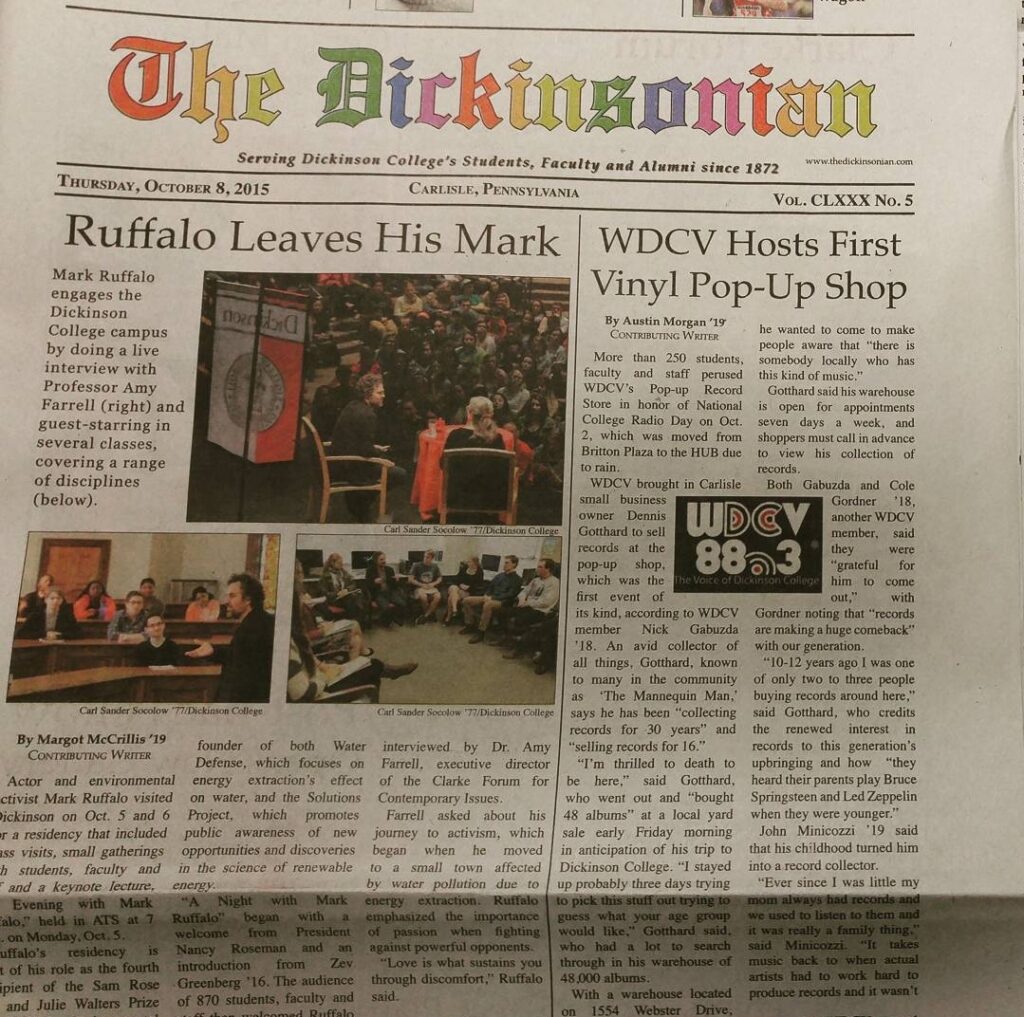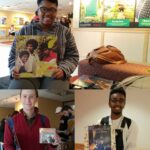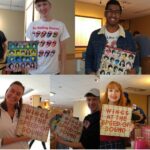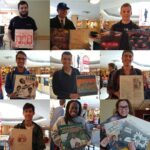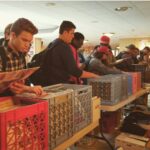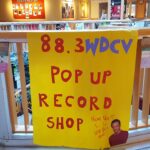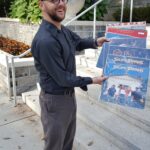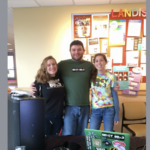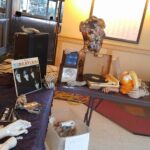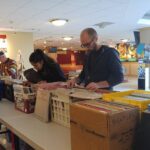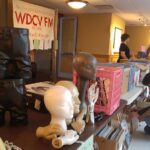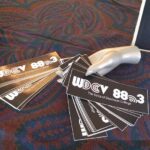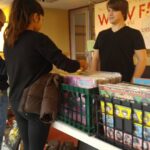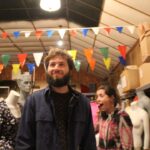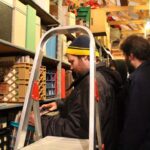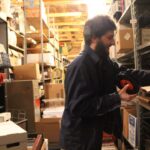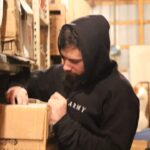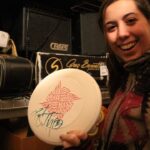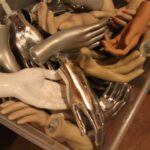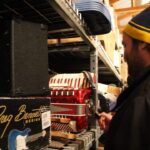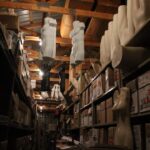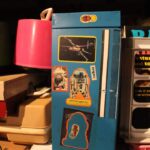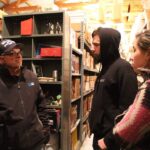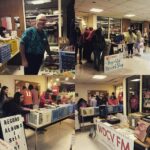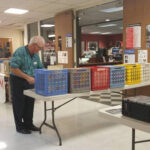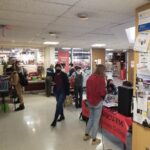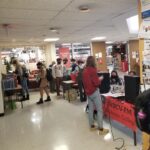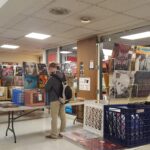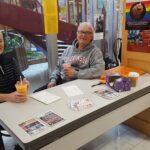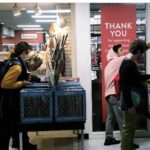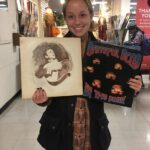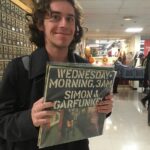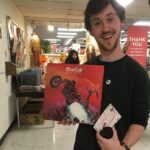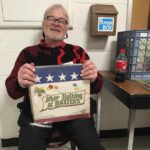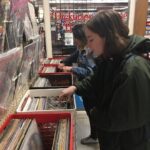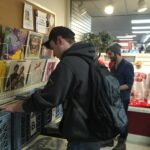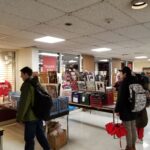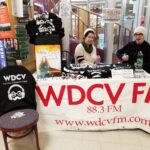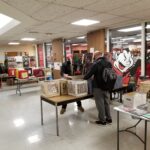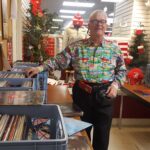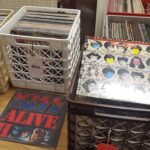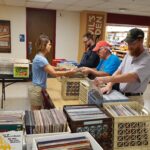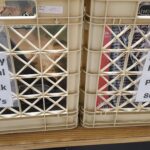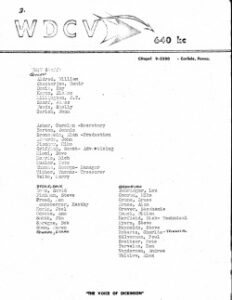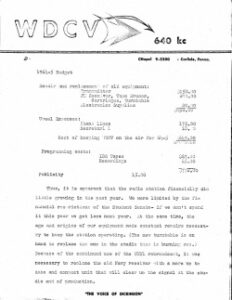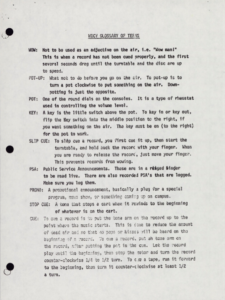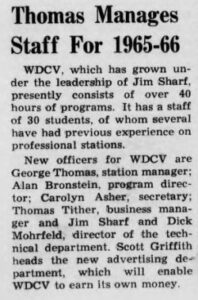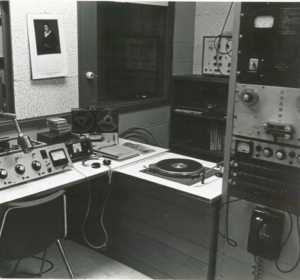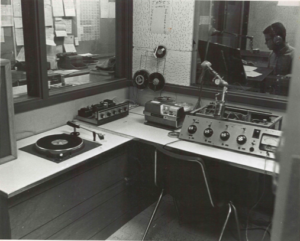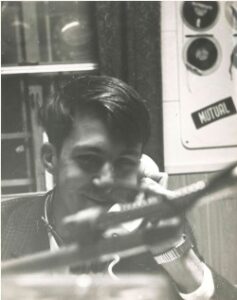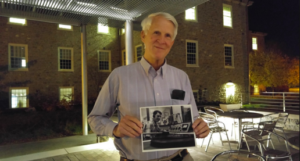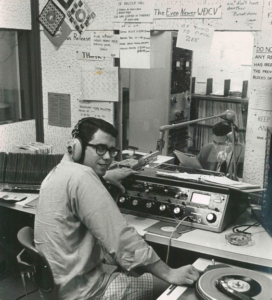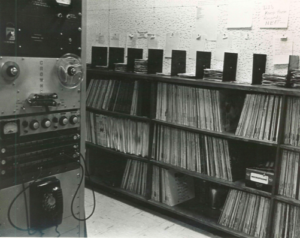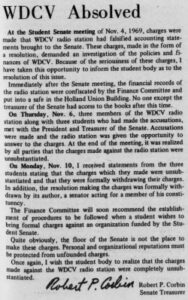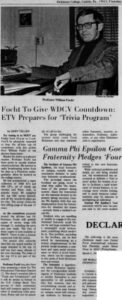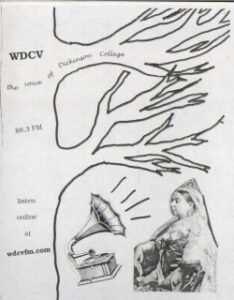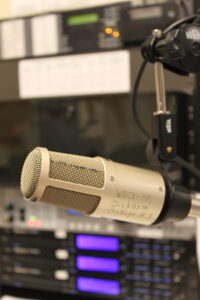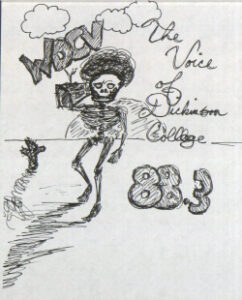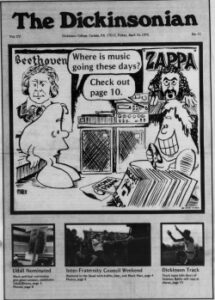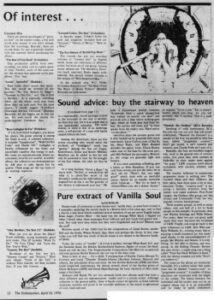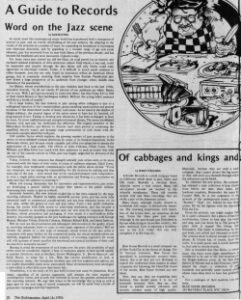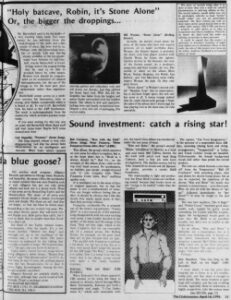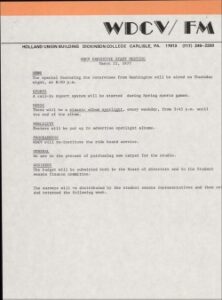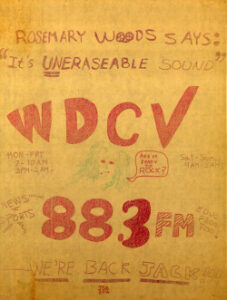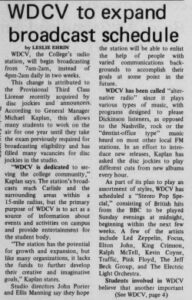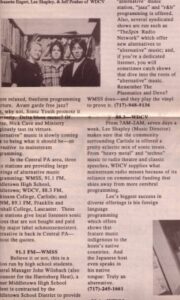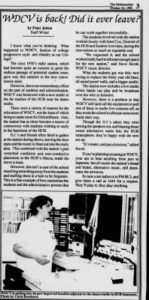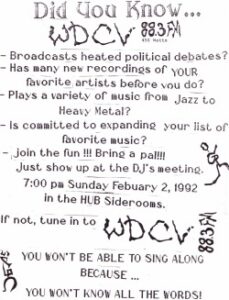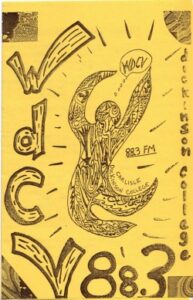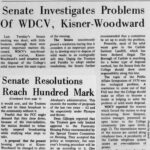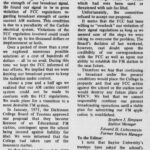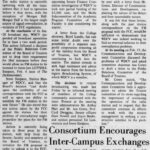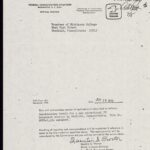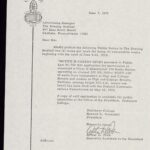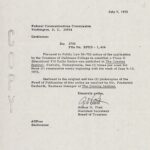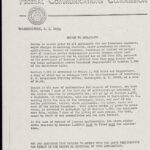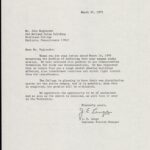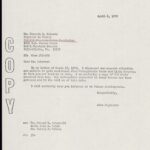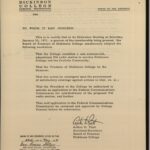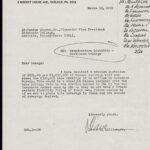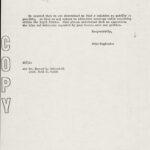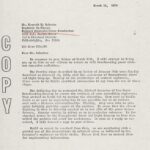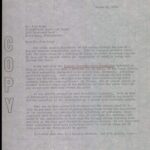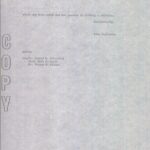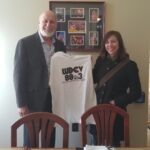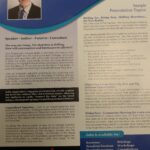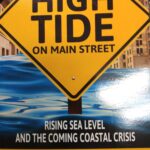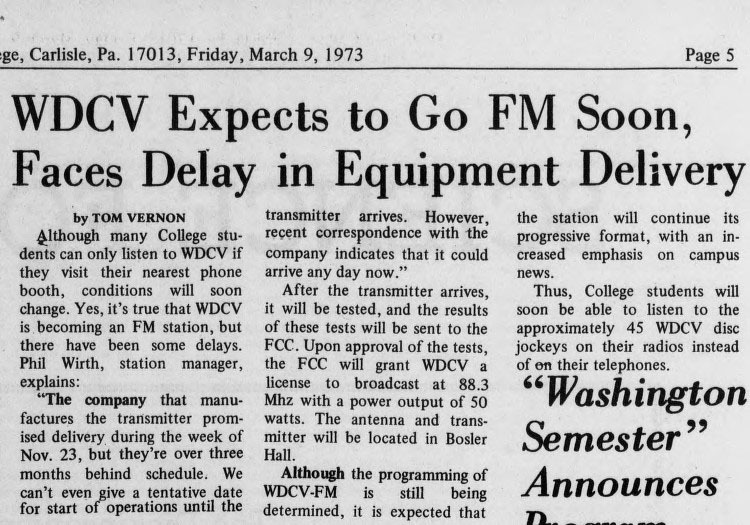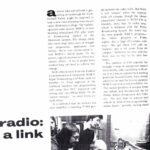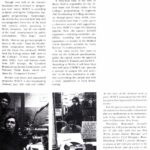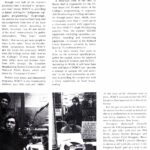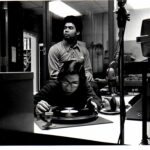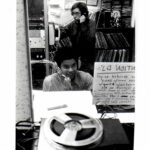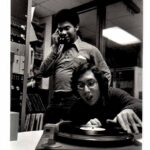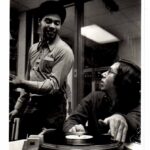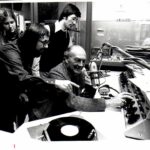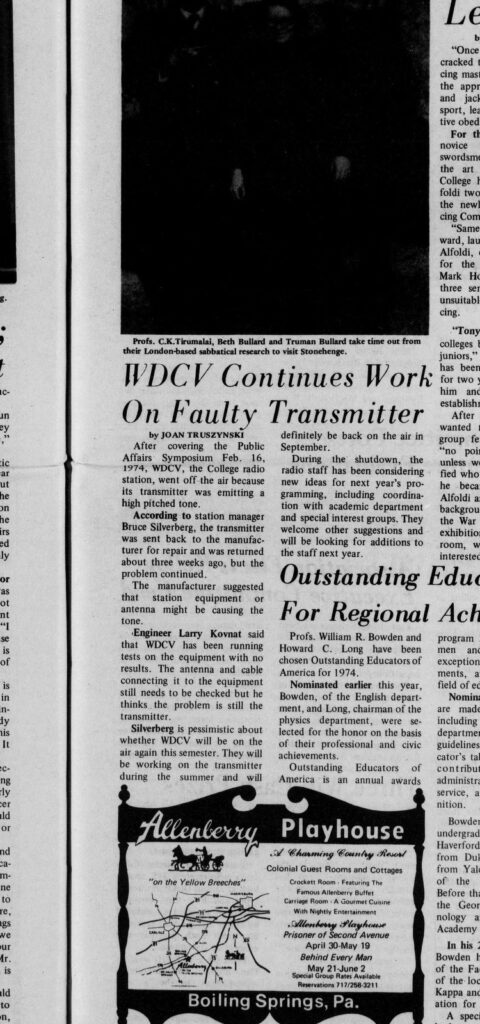-
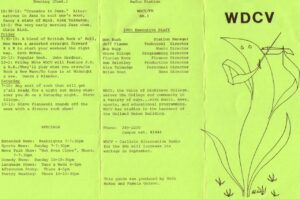
-
Show Schedule from Spring 1980
-
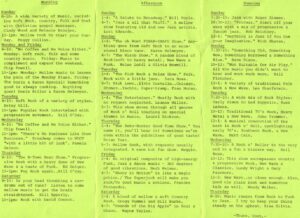
-
Show Schedule from Spring 1980
Show Schedule from Spring 1980
It is more important now than ever to preserve creative outlets for freedom of expression! Commercialization of the music industry has stripped artists and the community of this expressive experience, with college radio being free of sponsors and contractual obligations, it protects a true creative community. Our WDCV alums shared with us some of their stories of experimenting artistically on the air and how they cherish their time working with the radio!
Thanks to all the alums from the 80s for sharing their stories!

WDCV T-Shirt from 1980 (Thanks Helen Loidl ’80!)
David Dixon’ 80, Tom Hamill ‘80, Laurel Dickson-Bull ‘80
Frances Fernandez ‘81, Andrew Hyde ’81, Elizabeth G. (Betsy Gill) Walters ‘81, Barb Freda ’81
Bill Epperly ‘83, John Philip ’83, Greg Zimmerman ‘83, David Alterman ‘83, Stu Fischer (with a “C”) ‘83
Roderic Flowers ‘84, Lori Pellnitz ‘84, Laurie Bacon ’84, John Basso ‘84
Andrew Brotmann ‘85
Eric Philip ‘87, Dolores “Deeg” Shank ‘87, Pete Frengel ‘87, Christine Olinick Lowry ‘87
Ed Weber ‘89
Are you an alum reading right now and want to share a story with us? Add yours to the People’s History of WDCV!
David Dixon’ 80

David Dixon ’80
Do you have any stories, memories or secrets related to WDCV that you would like to share with us?
“My favorite memory was interviewing The Ramones, on-air, prior to one of their concerts at Dickinson. Joey, Deedee, Johnny, and I think Tommy Ramone all crammed into the tiny, secondary studio, with me and the Program Manager, and we just talked.”
Where was the station located when you went to Dickinson?
“Downstairs at the HUB, to the right of the college store. I think the area has been taken over by the college store now. We expanded out the back for record storage (yeah, we actually had “records” back then). We also installed a new transmitter and increased our wattage during my time there.”
Some Colleges have sold their broadcast licenses in recent years. We are grateful Dickinson still supports us and cares about College Radio. Do you think college radio is still important? Tell us why!
“It provides a great outlet for new music, and allows college students to express themselves through music. When I ran DCV, our format ranged from Rock’n’roll to classical, and everything in between. We encouraged our DJs to show off their divergent interests in music, and they created some very innovative shows.”
Any parting thoughts?
“I never had more fun than the time I spent on-air at DCV”
Tom Hamill ‘80
What was the name of your radio show and what time slot did it air?
“I was TJ the DJ. Freshman year I did a 8-10 am Thursday show. Junior year I did something like 4-7 on Sunday. Plus I did a lot of cover shifts so I got a lot of different air time.”
Do you have any stories, memories or secrets related to WDCV that you would like to share with us?
“1976 was the beginning of the punk revolution. While I was listening to ELO, ELP, Yes and Genesis at the time, I was intrigued by the Ramones and Sex Pistols and brought a little of that into my show. The Music Director heard it and came down to tell me it wasn’t good music for the time slot. He also helped me out a lot with my music mixing techniques so it was overall a plus visit. But I wound up mellowing my playlist way down. In May, the last day he was Music Director, he came into my show, grabbed the Ramones and put them on the turntable. I looked at him quizzically as he started Blitzkrieg Bop. He said “hey, I was wrong, loosen up.””
Who was the WDCV advisor at that time?
“We had an advisor?”
Some Colleges have sold their broadcast licenses in recent years. We are grateful Dickinson still supports us and cares about College Radio. Do you think college radio is still important? Tell us why!
“Progressive radio rocks! You miss 99% of the music with no crossover on commercial radio.”
Any parting thoughts?
“I always loved requests because you knew somebody was listening but you can only play Moondance so many times. And then there were the townies with Budgie.”
Laurel Dickson-Bull ‘80
What was the name of your radio show and what time slot did it air?
“I can’t remember! I think I was on Saturday mornings and it was a Rock show.”
Do you have any stories, memories or secrets related to WDCV that you would like to share with us?
“The radio station back in 1977 was pretty basic and pretty grimy, but I loved it. People actually smoked in the radio station! The albums were all vinyl of course and kept in a library in a side room. I remember Dewitt Long had a great jazz show and Dave Manges knew everything about contemporary rock… Jennings (what was his first name, Jim? Paul? …) anyway, he booked the best concerts. The Ramones, Warren Zevon, Steve Martin, Hot Tuna, Buddy Guy, Steve Goodman. Such a well-chosen eclectic mix!”
Frances Fernandez ‘81
What was the name of your radio show and what time slot did it air?
“Ebony in motion TGIF 2-5 FRIDAYS”
What was your involvement with WDCV?
“DJ from freshman year through graduation, Production staff prom carts, New LP reviews”.
Do you have any stories, memories or secrets related to WDCV that you would like to share with us?
“What happens at WDCV stays at WDCV”.
Andrew Hyde ‘81
What was the name of your radio show and what time slot did it air?
“I had several shows:
— a rock show for three hours on Thursday nights
— a half hour reggae show on Tuesday evenings
— a Big Band show on Sunday afternoons.
I was also news director for awhile”
Do you have any stories, memories or secrets related to WDCV that you would like to share with us?
“The best story on which I have based a draft play is the experience at the radio station when 3 Mile Island erupted. Being underground, the station was rated as an emergency broadcaster. We had a struggle with President Sam Banks, however, when he suggested evacuating all the students. We stayed on the air with volunteers, however, throughout the whole crisis.”
Where was the station located when you went to Dickinson?
“It was also on the lower level of the hub but just opposite the exit from the circular staircase. i think there is a convenience store there now (what a travesty! 🙂 )”

Photos from the station (circa 1982)
Elizabeth G. (Betsy Gill) Walters ‘81
What was the name of your radio show and what time slot did it air?
“I don’t remember a name, but as I recall, my show aired on weekday mornings. I remember that it played in the cafeteria during breakfast, which meant that I got lots of commentary from my friends. (In those days, kids actually showed up at the cafeteria three times a day.)”
Do you have any stories, memories or secrets related to WDCV that you would like to share with us?
“I played the music I liked at the time– I suppose it would best be described as “girly soft rock” — I certainly liked and played Eric Clapton, the Beatles, Elton John, Steppenwolf, Steely Dan, Lynrd Skynrd and the Grateful Dead, but also lots of Dan Fogelberg, Pure Prairie League, and a particularly sappy song called “Wildfire,” (by Michael Somebody-or-other, I think.)
I also parlayed my WDCV experience into an internship with a local radio station and was ultimately hired as a local radio newscaster. That career was brief, but fun. It particularly impressed my parents, who heard me for the first time as they drove into Carlisle for a visit, and said I sounded just like a real person. :)”
Barb Freda ‘81
What was the name of your radio show and what time slot did it air?
“I don’t remember any name, but Maureen Fitzgerald was the official host. We agreed to do it together and she was the one who passed whatever it was to make it official. If I recall correctly, we were on on Sunday nights from 10 p.m. to 2 a.m.”
Do you have any stories, memories or secrets related to WDCV that you would like to share with us?
“I remember being so tired I didn’t want to play a lot more songs, so I decided to play all of one side of an Alan Parsons Project album, I Robot (which I just dredged up from my memory–30 years gone by…listening to it right now). I got some comments about that, including something about weird music I had chosen. I’m guessing I played other things that had nothing to do with that music: Stephen Bishop, Linda Ronstadt…Maureen may remember more.”
Some Colleges have sold their broadcast licenses in recent years. We are grateful Dickinson still supports us and cares about College Radio. Do you think college radio is still important? Tell us why!
“We could do what we wanted to with no agenda. Glad to know Dickinson still has its radio station.”
Greg Zimmerman ‘83
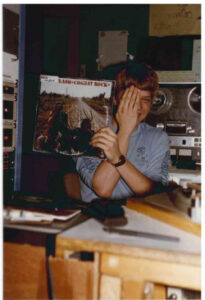
Live from the WDCV Studio! (Gregory E. Zimmerman circa ’82)
What was the name of your radio show and what time slot did it air?
“Breakfast with the Clash, early morning. Also did Saturday evening fill-ins. Also had a political commentary show with Professor Andrews for the 1980 presidential primaries and election”
What was your involvement with WDCV?
“DJ and political commentator”
Do you have any stories, memories or secrets related to WDCV that you would like to share with us?
“I loved the commentaries with Professor Andrews, and I remember playing INXS for the first time on campus when their debut album, Shabooh Shoobah came out.”
Bill Epperly ‘83
What was the name of your radio show and what time slot did it air?
“I had 3-4 shows over the years. Not sure they had names: a classical show, a new music show, a comedy show.”
Some Colleges have sold their broadcast licenses in recent years. We are grateful Dickinson still supports us and cares about College Radio. Do you think college radio is still important? Tell us why!
“I think so. It is one place where the particular culture of the campus shows itself.”
Any parting thoughts?
“Being part of WDCV was one of the great experiences of my college days. I’m so grateful for the experience!”
-
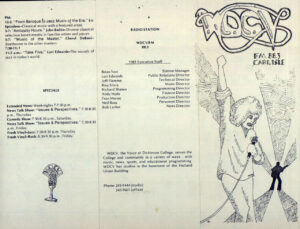
-
Show Schedule 1981My little eye just spotted something of note in this schedule. Friday 8-10am lists Roseann O’Donnell for the show “Good Morning Carlisle!” Could it be THE Rosie O’Donnell? We are pretty sure it is as she went here for just one year. We didn’t know she was a DJ though. Her show description reads: “Contemporary and Mellow Tunes to dry your hair by”
-
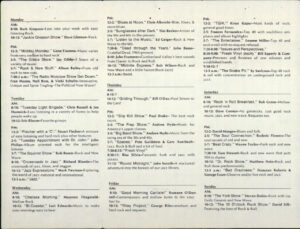
-
Show Schedule 1981My little eye just spotted something of note in this schedule. Friday 8-10am lists Roseann O’Donnell for the show “Good Morning Carlisle!” Could it be THE Rosie O’Donnell? We are pretty sure it is as she went here for just one year. We didn’t know she was a DJ though. Her show description reads: “Contemporary and Mellow Tunes to dry your hair by”
Show Schedule 1981-My little eye just spotted something of note in this schedule. Friday 8-10am lists Roseann O’Donnell for the show “Good Morning Carlisle!” Could it be THE Rosie O’Donnell? We are pretty sure it is as she went here for just one year. We didn’t know she was a DJ though. Her show description reads: “Contemporary and Mellow Tunes to dry your hair by”
David Alterman ‘83
What was the name of your radio show and what time slot did it air?
“I did a comedy show where Bill Epperly and I played comic routines on the radio.
We also performed a few original routines as well.
I also did a classical music hour. It was slotted in between a hip-hop hour and a new wave rock hour.”
What was your involvement with WDCV?
“I dj’d some kind of show every year I was there either a comedy or classical music show.”
Do you have any stories, memories or secrets related to WDCV that you would like to share with us?
“We once had a very renowned Early Music (medeval music) conductor and performer named Thomas Binkley visit my senior year. Prof. Slavin gave me some of his LP records to play on the radio to honor his visit.
After the hip-hop hour, I came on. I proudly announced what I was going to play, a “salterello” quick medeval dance. I had never heard the piece before.
After a few seconds, the phone rang. That was unusual for the classical show. Usually when it rang folks were dissappointed I was not playing hip-hop music and after I told them this was the classical hour, they always either requested “Bolero” or Pachabel’s “Cannon”. This call was different.
“David, this is Betzi.” I think the music is playing too fast.”
Indeed, I forgot to change the LP speed from 78 for the previous show, to 33 1/3 for mine.
I got a real dirty look from Prof. Binkey the next day, he was not very nice to me the rest of his visit and I had to sing for him for about a week or 2.”
Stu Fischer (with a “C”) ‘83
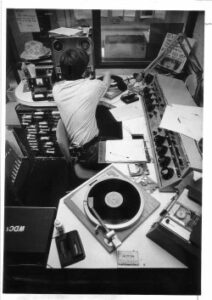
Photos from the station (circa 1982)
What was the name of your radio show and what time slot did it air?
“I had time slots in the morning, either from 8 to 10 or from 10 to 12 on various days during my last three years at Dickinson (1980-1983) except for the Fall of 1981 when I was on the Washington Semester. Because there (incredibly) was a Stu Fisher on campus that I was always confused with–and who often got my mail because he had the more common spelling of an uncommon name–I called my radio show the “Stu Fischer with a “C”‘ show to try and distinguish myself. After Stu Fisher graduated in 1982, I changed the name of my show to “The Grand Illusion”, the show that is so good that it’s unreal.”
What was your involvement with WDCV?
“In addition to being a DJ, I recorded a station ID that was used for years, imitating the voice of the 1960s cartoon character, Underdog (actually imitating his voice, the actor Wally Cox). The promo went like this: “There’s no need to fear, Underdog is here!/When I’m through with a day of fighting crime/I like to go home and sit around and unwind/And when I want great music it’s plain to see/I just change my dial to WDCV/88.3 on your FM dial, give us a listen, it will be worth your while.””
Do you have any stories, memories or secrets related to WDCV that you would like to share with us?
“1. Regarding the Underdog promo: back when I was working at WDCV, we used tape “carts” (cartridges) to play PSAs and Station IDs, but many DJs would forget to rewind them after they played so there would be a dreaded click when we put them on, followed by dead air. What I always did was if that happened to me, I just started doing my Underdog station ID live and went into the next record. If I had no cart problems during my entire show, then I did the Underdog ID live near the end of my shift.
- I was the first person on the air the morning after John Lennon was killed in December 1980. I played an all Lennon show and told stories about Lennon (which I knew as a Beatles fan). At the beginning of the shift I got an angry call from someone that was not aware what had happened and thought that I was pulling a sick joke.
- I was also on the air when the hostages were released from Iran on January 20, 1981. As a Democrat, I was appalled at Ronald Reagan’s election and volunteered to take all of the shifts from 10 to 2 that day (the semester was just starting and a permanent schedule had not been made yet). I was playing protest songs all day and heard the teletype ring like crazy when the hostages were released. So I actually got to turn the sound down on my record, take the mike and say “we interrupt this program for a special bulletin!” That was the highlight of my tenure at WDCV.
- I always tried to do theme shows on my shift, but one feature that I always did was the “Trivial Person of the Day” contest. The shpiel went like this: “Since we go to a liberal arts college, we should be above expecting material rewards for our achievements, therefore there is NO PRIZE given for winning the Trivial Person of the Day contest, just the pride and joy of knowing that you are the only person in the entire known universe that can call yourself the Trivial Person of the Day.” Then I asked a musical trivia question and the first one to answer correctly won and got another canned spiel ending with me applauding. Near the end of 1981, Roseann O’Donnell (now going as Rosie) substituted on the show after mine with Bill Hill III and started asking follow-up trivia questions to my then-winner, a Carlisle pharmacist named Bob Smith who was the first person to win the contest three times. In 2009, when I joined Facebook, I revived the Trivial Person contest (this time as the Trivial Person of the Week) and have folks from all over the country (including Jeopardy champions) playing. Dan Davis (1983) is the only person so far to win the contest on WDCV and on Facebook.”
John Philip ’83
What was the name of your radio show and what time slot did it air?
“The Wednesday Night Heavyweight Lineup with Jack Morris 8-10, me 10 to midnight, Tom Fleming midnight to when he got tired). 3 idiot football teammates playing music.”
Do you have any stories, memories or secrets related to WDCV that you would like to share with us?
“Was there when we turned on the 450 watt transmitter in 1981.”
-

-
September 16th, 1982- WDCV increases wattage, offers change in program
-

-
1983- WDCV modifies news operation after equipment is repossessed
Some Colleges have sold their broadcast licenses in recent years. We are grateful Dickinson still supports us and cares about College Radio. Do you think college radio is still important? Tell us why!
“Yes. While terrestrial radio is all but dead as an important enitity (am is a wasteland of extremist ideology and sports betting programming) there is a need for an eclectic place to broadcast music and discourse.”
Do you have any WDCV memorabilia hidden away that you might want to share with us? Please tell us what you think you may have and we will find a way to get a copy to us.
“I have some tapes from 1981 and that I can attempt to digitalize including a roast beef sandwich eating contest broadcast live in November 1982 from Rax Roastbeef on High Street and a March 1982 hockey game between Dickinson and Bucknell.”
Any parting thoughts?
“Love WDCV. Still listen online.”
Roderic Flowers ‘84
What was the name of your radio show and what time slot did it air?
“Soul Shot in 1980, then Soul Connection from 1981-1984 from 2p-4p”

Photos from the station (circa 1982)
What was your involvement with WDCV?
“I started as a DJ at WDCV playing oldies and R&B. I also served as Music Director for 2 years.”
Do you have any stories, memories or secrets related to WDCV that you would like to share with us?
“When I came to Dickinson in 1980 they were looking for variety and alternative music for WDCV. I was told that freshmen rarely get a prime time slot, if any, however, I was fortunate enough to get a prime time Saturday afternoon slot because I was going to play oldies, doo-wop and R&B, which was something that they never had before. I seized the opportunity and called by radio show -Soul Shot because I thought that might be my “sole shot.” As fate would have it, the show was well received and I was asked to return. I called myself the House Shocker, the Rhythm Rocker from that point forward.”
Lori Pellnitz ‘84
What was the name of your radio show and what time slot did it air?
“I had a number of time slots when I was at WDCV. My first one was Tuesday mornings from 10am to noon. It was my first semester freshman years – and I had a thick Long Island accent and called myself “The Islander.” I pretty much played various rock songs. I eventually migrated to my favorite time slot, which was Friday from 5pm-7pm and played “New Wave and Reggae” and the show didn’t have any name in particular.”
What was your involvement with WDCV?
“Started my first semester freshman year. By my sophomore year I was on the Exec Board and was the Public Affairs Manager. I also DJ’d, broadcast the news and sports.”
Do you have any stories, memories or secrets related to WDCV that you would like to share with us?
“I used to play alternative/new wave music when not many stations were playing it. I would go home to Long Island and record hours and hours of music from one of the top alt music stations in the country, then would go back to Carlisle and play some of the music I recorded on my show. One of the incidents that I really remember was the first time I played “Holiday” by Madonna. She was virtually unknown back then. The phone started ringing off the wall with people wanting to know the name of the song and who was the performing artist.”
Laurie Bacon ‘84
What was the name of your radio show and what time slot did it air?
“I don’t remember the name of our show, but Tammy Nestuk (’83) and I played classical music on Sunday mornings. This was during the 1980-81 school year, I think. (perhaps 81-82)
A symphony gave us plenty of time to throw laundry in the wash or the dryer just down the hall in the HUB basement.
This was when the station’s bandwidth was much less that it was just a few years later. I was grateful to have the opportunity to do something like this – I never would have been able to at a bigger school.
Happy 50th! (wait, I’m a year older that WDCV? oh my, I don’t know what to make of that.)
:)”
John Basso ‘84
What was the name of your radio show and what time slot did it air?
“Uncle John’s Band: 7-8pm every Monday night…”
What was your involvement with WDCV?
“Live Dead tapes played with a little history of the band, I recall it was on Monday’s as John Lennon was murdered on a Monday night and the AP ticker would spit out the news to read live on air, i had just gotten off the air when the next DJ, John Black, announced the news…everyone wore black on Tuesday…”
Do you have any stories, memories or secrets related to WDCV that you would like to share with us?
“The doctors from Harrisburg would call the show and ask what year was the recording from, I had an extensive collection of bootleg cassettes and the campus had loads of deadheads, it was nice being at frat parties and someone would say they liked my show…”
Andrew Brotmann ‘85
What was the name of your radio show and what time slot did it air?
“The Sound Connection- Fridays from 6-8PM”
Do you have any stories, memories or secrets related to WDCV that you would like to share with us?
“My first time slot was Saturday morning from 6-8AM. By senior year i had graduated to the 6-8PM slot on Friday evenings, just while everyone was getting ready to go out. My most memorable moment was doing a ‘War of the Worlds’ type show where I said that portions of the campus were under attack. Since it was 6:30 in the morning, i figured no one was listening. But, we started receiving calls from the Carlisle PD and Fire Dept and I had to cut my planned show short. Who knew so many Townies listed to WDCV?”
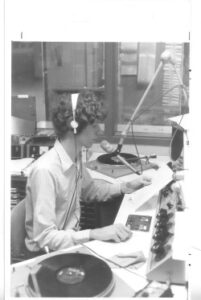
Photo from 1980(ish)
Eric Philip ‘87
What was the name of your radio show and what time slot did it air?
“The Rumble Show. Played on Saturday nights.”
What was your involvement with WDCV?
“I started as a Freshman as a fill in. I had regular slots my sophomore and senior years. (Did my junior year abroad,).”
Do you have any stories, memories or secrets related to WDCV that you would like to share with us?
“Here are some random memories. I played straight roots influenced rock and roll when new wave was the rage. “Rumble” by Link Wray was the show’s theme song. I used to get a lot of calls for requests and many were from people in the local listening area (non-student). The show went on relatively early on Saturday night and many people listened prior to heading out to the quad to party. I’d have people come up and talk to me later in the night about different songs. Back at the time I had to buy and play my own records although I found a few (very few) gems in the library. So I played a lot of deep cuts. One of my fraternity buddies caught some guys walking down the street one day with a box of my records (they dropped them and ran when challenged). In those days we had to play periodic PSAs which were on “carts” that were like an 8 track tape. I tried to find the shortest ones possible so as not to detract from the listening experience.”
Some Colleges have sold their broadcast licenses in recent years. We are grateful Dickinson still supports us and cares about College Radio. Do you think college radio is still important? Tell us why!
“Yes – it’s a creative outlet for students. Radio remains an art form – the segue between songs, the narration about a band or a track, the difference between shows. It’s dominated commercially by bot driven playlists which has taken a lot of the art away. College radio is one of the few places where that tradition can remain.”
Dolores “Deeg” Shank ‘87
Do you have any stories, memories or secrets related to WDCV that you would like to share with us?
“I got a phone call after the activities night asking did I still want to do a Sinatra show. Of course I said yes. He asked if I could start that night. Yes! I went to the station (felt like a closet off where convenience stores is now in the HUB.) He ‘showed me the turntables, 8-track PSA stuff, mics, etc. Then he says, you’ll be fine, call me if you need help…and I was in the air in about 10 min. Later! When I returned to the airwaves in 2010 (Davis Tracy hooked me up) it was still the same control board as 1987! That was funny! Since upgraded but it was nostalgic for a while.”
Where was the station located when you went to Dickinson?
“‘Closet’ at bottom of spiral staircase in HUB.”

Live from the WDCV Studio! (Cheryl A. De Bari ’81)
Some Colleges have sold their broadcast licenses in recent years. We are grateful Dickinson still supports us and cares about College Radio. Do you think college radio is still important? Tell us why!
“Yes! It’s freedom not found on commercial radio. No “obligations” to owners/sponsors/commercials. Such great variety or shows too. I am sooooo thankful I am able to continue my show and keep the music I love on the airwaves. Thank you Dickinson and all who keep it on the air!!!”
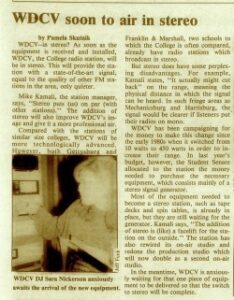
February 16th, 1989- WDCV Soon to Air in Stereo
Pete Frengel ‘87
What was the name of your radio show and what time slot did it air?
“”College Rock Radio” – If I remember correctly (and there’s only a slim chance of that) my show was on Saturday afternoons, maybe 4:00 to 6:00, in 1984-85 and 1986-87.”
What was your involvement with WDCV?
“I was a very, very small part of a movement that popularized “college rock” nationwide – a movement that eventually became known as “alternative,” or “alternative rock.” According to wikipedia, “These [college] stations were the majority broadcasters of this music, as the stations’ playlists were often created by students who preferred underground rock music.”
Bands like U2, R.E.M., the Talking Heads, the Smiths and the Cure went on to commercial success, but in the early 80’s they were considered edgy and not mainstream. Other great bands never made it as big, but were widely respected on college campuses: Hüsker Dü, Sonic Youth, the Meat Puppets, Dinosaur Jr., the Replacements, Violent Femmes, Camper Van Beethoven, and the Pixies, to name a few.”
Do you have any stories, memories or secrets related to WDCV that you would like to share with us?
“My friend, Randy Ensley (’85), aka “Slomo,” loved classic rock of the 60’s and 70’s and had less appreciation for the new music coming out. When I knew he was listening to my show, I’d use the two turntables to blend a portion of Led Zepplin into a Smiths song, or segue some Pink Floyd into the bridge of an R.E.M. song. I’m not sure that I did too much to further my “college rock” cause, but it kept us amused at the time.”
Where was the station located when you went to Dickinson?
“Descending the circular staircase in the HUB, you’d make a right and it was straight ahead. In the backroom there were thousands of LPs – a treasure trove – but I mostly brought my own in a milk crate.”
Christine Olinick Lowry ‘87
Do you have any stories, memories or secrets related to WDCV that you would like to share with us?
“It took place near dinner time once a week. Whenever we started broadcasting, the Holland Union Building speakers would be turned off. I remember it was very popular with the local prison and we would get requests from there. We played all the popular Hard Rock/Metal of the time and my co-DJ would wheel his albums in a kid’s wagon over to the station because DCV did not have the appropriate material. I think we were also one of the first to play Guns and Roses on the radio. The station had received an advanced copy of their first album and we enjoyed playing it. On our final show we played a song by WASP that pushed the envelope, but it was a fun farewell.”
Jeannie Gabardine Thatcher ‘88
What was the name of your radio show and what time slot did it air?
“House on Pooh Corner, Tuesdays and Thursday, 10:00 a.m. to noon”
What was your involvement with WDCV?
“I was a freshman and a friend of mine from Phi Psi had a show, couldn’t do it at the last minute and asked me to fill in. Talk about learning as you go! It was a lucky break because I had a show all four years.”
Do you have any stories, memories or secrets related to WDCV that you would like to share with us?
“Only that I loved every second of it. It was back in the day when you brought your own albums along with using what the station had. It was great running into people who said, I heard your show today and I loved that song ….. I had a following albeit a small one.”
Ed Weber ‘89

Photo from 1980(ish)
Do you have any stories, memories or secrets related to WDCV that you would like to share with us?
“I had a two-hour time slot. I had a friend that had a time slot adjacent to mine. We were both Who fans. One week we took all four hours and played nothing but back-to-back Who songs. We even played different versions of the same song one right after the other. The weirdest thing we did was put the same record on two different turntables and played them at the same time. It created quite a strange stereo effect. I’m not sure how much our listeners cared for our creativity.”
Some Colleges have sold their broadcast licenses in recent years. We are grateful Dickinson still supports us and cares about College Radio. Do you think college radio is still important? Tell us why!
“I think it is important because it gives an independent creative outlet, and allows students to decide what types of music and information is broadcast on campus and in Carlisle.”
David Brower ‘89
What was the name of your radio show and what time slot did it air?
“I don’t remember giving my shows names. I did the standard rotation shows in the evenings. One year I hosted The Cumberland County Revue Sunday mornings. I remember Davis Tracy calling me one morning with a compliment on the bluegrass I was playing at the time.”
What was your involvement with WDCV?
“I was a DJ and then spent 2 years as Music Director, or some would say Music Dictator.”
Do you have any stories, memories or secrets related to WDCV that you would like to share with us?
“I loved hanging out at the station and opening the mail. We’d get so many great and important records. We also had fun booking concerts to put on at ATS. We had a constant fight against the group that booked lame big name bands. I fondly remember one of our young DJs doing a cookout outside Kline center during the Eddie Money show. He gave away free hot dogs to anyone that was NOT going to the concert. That was the year I couldn’t find $250 to book the Indigo Girls to play at the snar.”
Tom Ciglar ‘89
What was your involvement with WDCV?
“I started doing shows with a friend in 1987. He had a lunch time oldies show. I started doing my own show in the winter of 1988 and I guess you would have called it “college rock”, though I did occasionally fill in for one or two of the metal shows.”
Do you have any stories, memories or secrets related to WDCV that you would like to share with us?
“No secrets, but I do remember helping set up some station id’s with guests at Dickinson, Abby Hoffman being one of them. Also remember one of dj’s being on a semester abroad in England and seeing Billy Bragg on the street in London, accosting him with a tape recorder and coaching him through a station id right there on the street.
Getting to see the Ramones in Baltimore on comp tickets so that we could interview their opening band. I don’t remember the opener’s name, they never made it big, and the Ramones wanted nothing to do with us, but still I got to see the Ramones live.
Some of the radio staff got a little tired of quality of the spring concerts in those days so we started a music production company of our own and brought bands to campus for smaller shows. We weren’t much of a financial success, but we did bring some great groups to campus. I remember Fugazi, Kingface, the Cynics, and a number of others playing ATS. It was great to be part of it.”
Erika DeCree ‘89
What was the name of your radio show and what time slot did it air?
“Caffeine Express – Tues. & Thurs 6-8am 1986-87, Sunshine Daydreams – Wed 2-4pm 1987-88”
What was your involvement with WDCV?

WDCV Shirt Logo Late 80s/Early 90s
“Started Spring of Freshman year (1986) as an intern for Seniors Janice Rowley 7 Helen Seaman. Personnel Director 1986-87 semesters.
It was all about the music all the time!”
Do you have any stories, memories or secrets related to WDCV that you would like to share with us?
“When the Class Officers/Senate selected Eddie Money for the Spring Concert, there was a velvet revolution at DCV. Several of us, appalled by the uninspired selection, played Eddie Money ad nauseum. The campus was sick of him before he ever got to the Kline Center. Eddie then berated the student body, from the stage, for not “showing up”. It was basically supported by the Carlisle locals.”
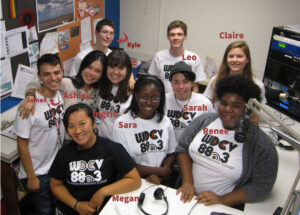 August 2014:
August 2014:
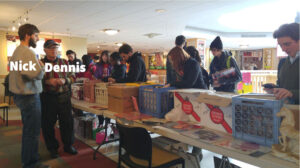 Every great event starts as a great idea. In the fall of 2015 we started planning an event for College Radio Day. College Radio Day was a recent celebration that started in 2011 because many colleges, especially ones in larger metropolitan areas, found that in the budget crunch after the 2008 recession they could make a quick dollar by selling their off their radio license. Internet radio is not the same and to have an educational radio license is something we all need to cherish. One of our execs, Nicholas Gabuzda ’18, pondered how we could get more folks to buy records since Carlisle didn’t have a shop and he remembered our podcast about Dennis. What if Dennis could bring some of his inventory to us? What if WE could be the record store….for just one day? BEHOLD! The Pop-Up Record Shop was born!
Every great event starts as a great idea. In the fall of 2015 we started planning an event for College Radio Day. College Radio Day was a recent celebration that started in 2011 because many colleges, especially ones in larger metropolitan areas, found that in the budget crunch after the 2008 recession they could make a quick dollar by selling their off their radio license. Internet radio is not the same and to have an educational radio license is something we all need to cherish. One of our execs, Nicholas Gabuzda ’18, pondered how we could get more folks to buy records since Carlisle didn’t have a shop and he remembered our podcast about Dennis. What if Dennis could bring some of his inventory to us? What if WE could be the record store….for just one day? BEHOLD! The Pop-Up Record Shop was born!



